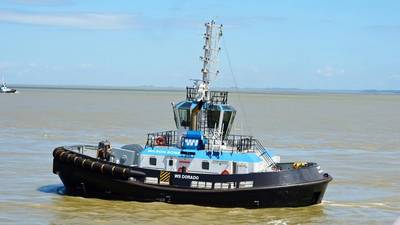Wilson Sons Adds New Tug WS Dorado in Brazil
Wilson Sons said it has started operations on WS Dorado at the Ponta da Madeira, Itaqui and Alumar terminals facilities in São Luís, Maranhão.
Designed by the Dutch Damen Shipyards, it is the fifth powerful tug with more sustainable technology in a range of six 2513-class tugboats. Built at the company’s shipyards in Guarujá (SP), the new tug will support berthing and unberthing operations in these terminals facilities, attending large ships exporting iron ore, which carry up to 400,000 tons of cargo.
WS Dorado joins the company's fleet of 11 tugboats in that region. At the Ponta da Madeira Terminal, owned by mining company Vale, the tugs support iron ore ships. Strategically located, closer to leading consumer markets (USA, Europe and China), the terminal is one of the main exit gateways for iron ore produced in Brazil.
At the Port of Itaqui, the tugs attend ships carrying, for example, diesel, corn, soy, fertilizers and wood pulp. In addition to its importance for agribusiness, the port stands out in the liquid bulk sector by handling 8.3 million tons in 2023, 8 million of which are just oil and oil products.
According to Wilson Sons, as WS Dorado starts operations, it improves the fleet allocated to port facilities in São Luís do Maranhão, and is expected to make a positive effect, in the end of July, with the increase in power and onboard technology in three other ports in Brazil: Salvador (BA), Belém (PA), and Cabedelo (PB). This is because each time Wilson Sons receives a new tug from its shipyard there is a significant impact on the Brazilian ports where it operates, felt in different ways, which shows the strategic importance of continuously strengthening its tug fleet.
Initially, when a new tug is allocated to one of the ports in which the company operates, replacing an old tug, it does not only boost the efficiency of port operations, but also ensures that the latest technologies and innovations are available to meet customer demands. Newer tugs are generally more fuel-efficient, have more advanced safety equipment and are more powerful, which significantly improves the port's operational capacity.
The replaced tug, in turn, is relocated to another port to add to the existing fleet. This relocation process creates a cascade effect, benefiting multiple locations. Ports receiving these relocated tugs experience an increase in maneuverability and service, allowing a faster and safer flow of ships and cargo. This is particularly important for smaller or less busy ports, where the improvement of the fleet makes a substantial difference to operational efficiency.
“This strategy of allocating and relocating tugs optimizes our resources, maximizes the impacts, and ensures that all ports under our operation are able to run with maximum efficiency and safety,” says Márcio Castro, executive director of the Towage division at Wilson Sons. Márcio further adds: “If we consider the company’s project of building six new tugboats, all Brazilian ports where we operate are positively impacted by it.”
Wilson Sons’ new tugs are equipped with over 90 tons of bollard pull and are the first in Brazil following the IMO TIER III standard established by the International Maritime Organization, which attests to the reduction of up to 70% of nitrogen oxide. This standard is only required in emission-controlled areas, such as in some regions of North America and Europe. Their innovative hull design by Damen Shipyards (RSD 2513) leads to reduced greenhouse gas emissions and an estimated decrease of 14% in the consumption of fossil fuels, supporting the improvement of air quality in the ports where they operate.
Twin fins improve seaworthiness and increase drag capacity in maneuvers, which ensures smaller fuel consumption and, consequently, lower emissions. The tugs are 25 meters long and 13 meters wide, operate forward and aft with the same efficiency, and can be used in port maneuvers and deep-sea towage.
“WS Dorado is particularly notable like others in the same class due to its impressive bollard pull of over 90 tons and energy efficiency. These tugboats, the most powerful currently operating in Brazil, are aligned with the high standards required in the operations of our clients' ships,” says Márcio Castro.
With the delivery of WS Dorado, the company reached the milestone of 153 vessels built in its shipyards. More than 80 tugs operate along the Brazilian coastline and are present in more than 40% of all berthing maneuvers in Brazil.
Mateus Melo, ES, North and Northeast manager at Wilson Sons, says that WS Centaurus, WS Orion and WS Dorado show the importance of the company's operations in the North/Northeast of Brazil, especially in Ponta da Madeira.
“We have been operating in Ponta da Madeira for more than three decades by conducting safe, sustainable and efficient operations. With a towage fleet designed to keep up with the expansion of Arco Norte ports, we are the company with the greatest availability of tugs and the greatest service coverage,” he says.















